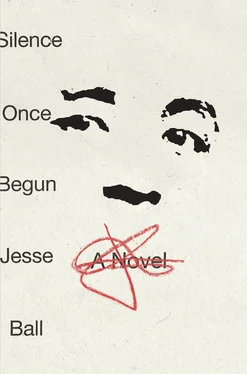They would drag him off to a trial. The trial had begun and they wanted him to say things, so they were starving him and speaking to him, examining him, telling him things, asking for his signature. His hands were trembling even when they lay still. His eyes were open — they had stopped closing, I suppose this happens when one doesn’t eat. Finally, it was enough. They brought him food and he began to eat. Even once they were bringing it, though, he could not eat it. His throat had forgotten its purpose. The food just wouldn’t go in. So, it had to be retaught and this took a few days.
In the second part of my life, my love was rescued from starvation by a series of bowls of food. I did not ever see him eat. Such things were not allowed. But, I saw him standing one day. I arrived in the morning, quite early, and he was standing when he could not stand for weeks.
My dear, I called, my standing dear. How well you stand.
He looked at me and explained it, that he had begun to eat once more. That he had broken them. The trial was over, too. I knew that, and I was glad of it. I had the newspapers in stacks. I read them over and over. I had found the place where he would be on the map, and looked up the route.
My dear, I told him that last time, I will join you in the new place.
That was the end of the second part of my life.
++
In the third part of my life, I traveled to a prison that was built underground in order to avoid the moon. Jito Joo was the name I would give, and they would allow me to climb through a narrow aperture. They would show me into a hallway and down a hallway. They would show me to a roped-off area, where little rooms knelt like parishioners, each one bending its head. When the guards pulled a lever, the rooms would open, as many as they liked, or as few. I was allowed to go in, suddenly. I who had never been allowed in, I was suddenly allowed in. Sotatsu was sitting on a pallet. He was staring at his hands. He did not look at me. This was the first time I had seen him, I think, in my entire life, such was my feeling. I said, I am looking at him and he is here. He looked up, hearing my voice, and I sat there by him, my arm brushing against his side and shoulder.
Where will we go?
In the third part of my life, I practically lived in the cell with Sotatsu. Properly speaking, I, of course, was far away, mostly. I was mostly on the bus, going to the prison, on the bus leaving the prison, in the house with Kakuzo, sitting, eating, walking on the streets of our village, muttering greetings. I was mostly carrying on that way. But still, as I say, I practically lived in the cell. Every chance I got, I snuck away there. I was like a child with a hiding place. Where is Joo? Where has Joo gone? Joo may be found in the death cell of a prison with her beloved.
I believed then that the third part of my life was my whole life. I had forgotten about the two previous parts. I did not expect a fourth. I believed we would continue that way. Everyone on death row had been there always. They were very old. They expected to die of natural causes and be given neat Buddhist ceremonies attended by whatever gentle family members remained. In this we encouraged them, the guards encouraged them, the guards encouraged us. We were all sternly encouraged in the belief: the world would last forever.
Sotatsu, I would say, some speak of the great cities of the world where anything can be bought. These are the sorts of things I would say, and he would laugh. We would sit, laughing, like old campaigners. (I have known a few, and we are not like old campaigners, he would say by smiling, and I would say, you have known no old campaigners but we are old campaigners of a certainty.)
The third part of my life was where I was told the meaning of my life. One knows the weight of a thing when it is strong enough to bear its own meaning, to hear its own truth told to it, and yet to remain.
Sotatsu, I said, I am your Joo. I will come here forever and visit you. All I need is a small profession, just enough money for the bus and for food. I need no children, I need no objects. I need no books, no music. I am a great traveler like Marco Polo, who visits an interior land. I travel deep into the heart of a place between walls, built between the walls of our common house. I am an ambassador, an embassy sent to a single king. You are that king, my king, my Sotatsu.
Then, he would hold up his hand as if to say, such wild notions do very well, but we must be careful.
Or — let us throw even such caution as this to the winds. Let us be like all the cavalry of ten armies.
These expressions of his, they made me wild! I would leap to my feet and sit again. The guard would come running, thinking he was wanted for some small thing, a glass of water or a query.
No, I would say, it’s only that Sotatsu made a joke.
Then Sotatsu would look at his feet, which, predictably, were doing the things that feet do.
In the third part of my life, I came to a far place. I decided that I would move into a room near the prison. I decided that I had enough put away, that I could do that. I was planning it. I did not tell Sotatsu. I came the night I decided it, and I was allowed in very late. I have told you there were no obstacles and it was always true. No obstacles. I appeared and was admitted. I was taken to his cell, and the guard shut the door. He pulled a shade. I didn’t know the shade was there, but he pulled it, and the cell was closed off. It could no longer be seen from without.
Hello, my Sotatsu, I said, and I went to him. It was the last of all my visits, and the longest. When I left the sun was halfway up in the sky. The bus had come and gone. There were no more buses that day, but one came. An empty road stretching in both directions. Then, the friendly nose of a bus drifting along. The bus driver said, you are lucky, young lady. There are no buses in this direction, not until tomorrow. I just happen to have gotten lost. Then he took me back in the direction of Sakai.
I felt when I left that day that I would return immediately. I would wait for the sun to set and then I would set out. I would be back again and pressing the buzzer, being admitted through the steel doors. I would be called upon to empty my bags, to leave my things and go past a thousand tiny windows with their attendant eyes. I had grown so used to these things that they calmed me. I looked forward to them as a series of gestures. I felt surely that nothing could take them from me. That any of it could or would end. It seems silly, but I did not believe it. Neither I nor my Sotatsu: we did not believe it.
This is a letter about Sotatsu who was my love; this is a letter about my one true life, which consisted of three parts. I am now in the fourth part of my life, and it has been false. It has been a false portion. In my estimation, they give you the false portion last.
Kakuzo, Kakuzo. Sato Kakuzo. In all my research, I had come upon him again and again only to hit upon one impasse or another. I felt that I must find him if I was to have the full story. As luck would have it, I managed to, but last of all, and only after a long search, culminating in a great piece of luck.
Here is how it happened:
A person like Sato Kakuzo — I imagined he could not be found unless he wanted to be found. The question then was: how does one make him want to be found? Or how does one make him reveal himself? I had a sense of Kakuzo’s vanity. I felt he was not a nihilist — and that he did truly believe in history, in a parade of history. I felt surely that he would not like the idea of a faulty account, of any faulty account. And if there was to appear somewhere a faulty account of him most particularly — or of something he had had to do with …
Читать дальше












